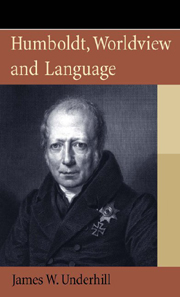Book contents
- Frontmatter
- Contents
- Acknowledgements
- Preface
- Part I Language and World
- Part II Humboldt, Man and Language
- 7 Worldview (Weltanschauung or Weltansicht)
- 8 Sprache
- 9 The Work of the Mind
- 10 Form
- 11 Creativity, Culture and Character
- 12 Catching the Character
- 13 A Seeing and Feeling Worldview
- 14 Four Dangers in the Comparative Approach
- 15 Reformulating the Worldview Hypothesis World
- 16 A Final Word
- Glossary
- Bibliography
- Index
15 - Reformulating the Worldview Hypothesis World
from Part II - Humboldt, Man and Language
Published online by Cambridge University Press: 12 September 2012
- Frontmatter
- Contents
- Acknowledgements
- Preface
- Part I Language and World
- Part II Humboldt, Man and Language
- 7 Worldview (Weltanschauung or Weltansicht)
- 8 Sprache
- 9 The Work of the Mind
- 10 Form
- 11 Creativity, Culture and Character
- 12 Catching the Character
- 13 A Seeing and Feeling Worldview
- 14 Four Dangers in the Comparative Approach
- 15 Reformulating the Worldview Hypothesis World
- 16 A Final Word
- Glossary
- Bibliography
- Index
Summary
If Humboldt's dual concern for the human faculty of language and for the comparison of different language systems is a dif-ficult and daunting one, then the enormity of the task of grasping a language's character and comparing it with another should instil in us a sense of humility. We cannot hope to fit into boxes the language which contains us, our thoughts and all we say. Comparing languages will not provide us with an assortment of boxes which we can order in some conceptual warehouse. And yet, the desire to find some kind of order among the infinite variety of languages, the attempt to seize something of the organising principle of different languages, animated Humboldt. In his attempt to achieve a fragmentary insight into the hidden whole of a language (a whole which was to some extent manifest in the interaction of the parts of individual texts), he hoped to form an idea not only of the way each language worked but also the way language as a human faculty evolves.
The present contribution to the Humboldtian project is a modest one: it aims to take up the concepts which we have used in English to speak about the relationship between language, thought and worldview, in order to reveal the instability and vagueness of these terms before returning to alternative formulations of that relationship. Given the unquestionable difficulty of comparing languages, it surely seems unwise to embark upon a Humboldt-inspired project without first clarifying our terms.
- Type
- Chapter
- Information
- Humboldt Worldview and Language , pp. 120 - 143Publisher: Edinburgh University PressPrint publication year: 2009



